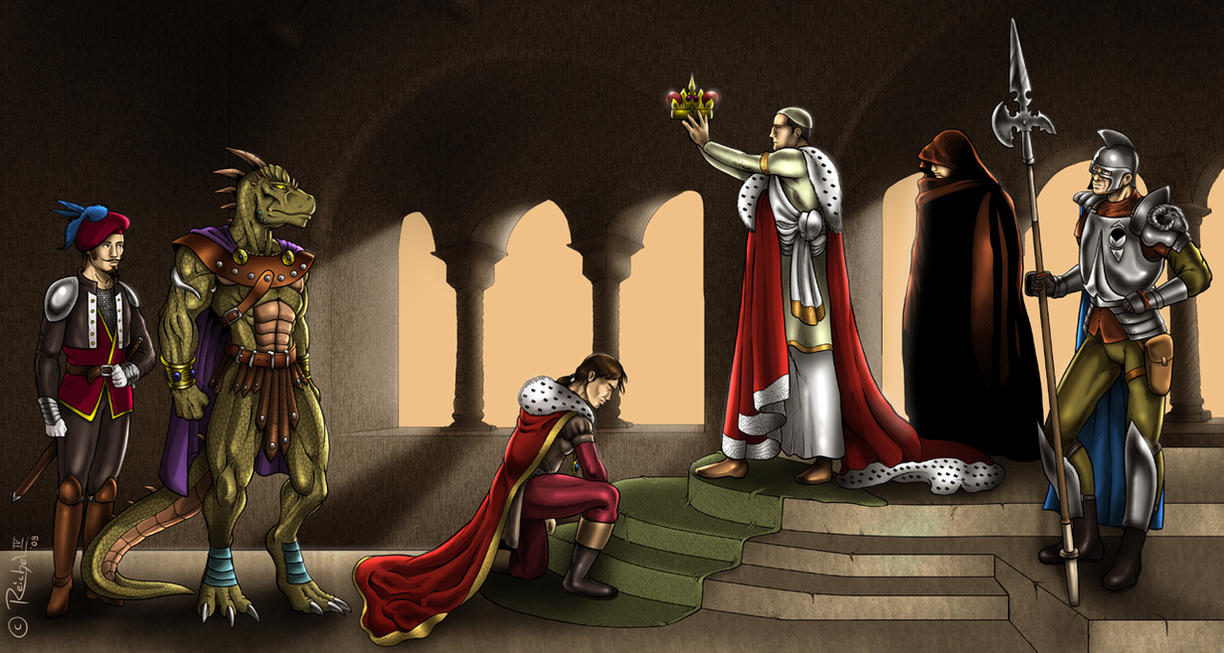Part of the Domain Game series of articles. Jump to the main page.
We've explored a simple way to describe provinces in
the first article in this series. Now that you have provinces, what can you do with them? And how often?
The Domain Turn
In the original AD&D Birthright rules, a domain turn lasted a season (3 months), but you could do three actions or more during this time. For the sake of simplicity, let's say a turn in the Domain Game lasts a month of game time.
I'll stick with the D&D 4e design philosophy for now. During a domain turn, you can perform three actions: Standard, Move, and Minor. I'll call these effort descriptors. You can use slots to perform a lesser action, so you can use your Standard slot to perform a Move or Minor action if you want.
Action Types and Scope
Different actions take different levels of effort, and some can only be done every so often to prevent a revolt. To model this, actions have a refresh descriptor: Yearly, Seasonal, or At-Will.
Every action affects a single province. If you want to expend an action to affect every province or holding type you control, raise the refresh descriptor one step (At-Will to Seasonal to Yearly). I'm thinking about requiring 2 actions of the same type in a single turn instead. That may model the extra effort better, but we'll see in playtesting.
Action List
Below is a list of actions. This is not exhaustive by any means, so if you see something missing or something that strikes you as odd, please let me know in the comments. The Domain Game is very much a work in progress, so feel free to chime in.
Actions are grouped by effort descriptor. The title is followed by the type of holding needed to initiate the action (or "Any" if its' nonspecific), then the refresh descriptor. The description covers the game effect of the action plus how it might look to a PC in the province.
Standard Actions
- Claim Province (Psionic/At-Will) - Lets you take charge of a province. The previous leader will probably object, so there's a dice contest that needs to happen to see what happens. The government changes, which could be caused by a coup, or someone else assuming power, or an invasion from the country next door.
- Create Holding (Any/At-Will) - Creates a holding of score zero in the province. You charter a new group to work on your behalf in a province. PCs may see an announcement or hear about job opportunities associated with the new holding.
- Inquisition (Any/At-Will) - Uses a holding to attack and destroy a different holding. You must successfully perform this action twice in a row with the exact same holdings to destroy the target. Depending on the source you use, this action can take the form of an inquisition (Divine), a series of arrests (Martial), bankruptcy (Shadow), magical attacks (Arcane), or simply the rejection of the holding's authority (Psionic).
- Invest Authority (Any/Seasonal) - Creates a lieutenant, minister, or other named official with the authority to act on the leader's behalf. You must give control of a holding to the newly-anointed lieutenant, and the lieutenant can perform Move and Minor actions from that holding without your permission. Lieutenants give your province more actions, but too many lieutenants can lead to intrigue and rebellion.
- Oath of Fealty (Psionic/Seasonal or Yearly) - This action officially turns over power so the province is ultimately working for a different leader. It takes time to adjust to the new order, from a season for a single province to as much as a year for a larger domain.
- Redistribute Resources (Primal/Seasonal) - You can plunder natural resources or pull peasants from the fields to bolster a holding in a hurry. Permanently reduce the Primal score of a province by 1 and add 1 to any other non-Primal holding in the province. Symptoms of this action include strip mining, clear cutting forests, and crops left to rot in the fields.
Move Actions

- Muster/Train Troops (Martial/At-Will) - You can create as many units of troops as you can afford, or retrain troops with upgraded weapons and equipment, if available. This action requires plenty of money. You can muster or train only as many units as your Martial holding's score.
- Trade (Shadow/At-Will) - Removes goods from the province and ships them to a different province in exchange for different goods or money. You can trade as many trade units of goods as your Shadow holding's score. Trade caravans or wagon trains will seem common when this action happens.
- Produce Goods (Shadow/At-Will) - Takes goods and transforms it to a more finished product, like manufacturing padded armor from wool, or spears from wood and iron. Requires money and raw materials. Goods may be used to improve military units. For instance, upgrading a conscript unit to a regular infantry unit may require a trade unit of leather armor, shields, and a unit of weapons that are better than pointed sticks.
- Agitate (Divine/At-Will) - The clergy have developed the skill of influencing the emotional state of the people. Use this action to change the people's loyalty for better or worse, or to get the people on board with a particular course of action. Can cause a popular uprising if used well. PCs may notice more prevalent handbills and other propaganda on the streets, and they may hear pointed messages delivered from the pious followers of the Divine holding.
- Research (Arcane/At-Will) - Spend money and effort into finding some new knowledge, either technology like the secret of making steel, or a new magic spell. I hope to keep the technology tree very player-designed rather than a rigid structure. Different technologies will have different requirements and will require a variable number of successful Research actions to discover.
- Explore Province (Any/At-Will) - This action can uncover a wilderness's raw statistics or give you a report of all holdings in a province and who controls them. PCs may notice a survey expedition or hear people asking questions about holdings, or be counted by an official census bureaucrat.
- Harvest (Primal/Seasonal) - Gathers raw materials from the province. Most of this is food, but other resources can be developed as the province grows. You may gather one trade unit of resources per point of Primal score. Food and resources will be covered later.
- Increase Holding (Any/Seasonal) - Increases both the score of a holding and the associated score of the province. PCs may see building projects and recruitment efforts involving the holding.
Minor Actions

- Decree (Any/At-Will) - This action covers anything from holding a festival to declaring war (or peace) to bestowing honors and rewards on war heroes. Government deals with so many mundane decisions, that this action is reserved for proclamations that impact people throughout the entire province.
- Mission (Any/At-Will) - Hiring adventurers to perform a specific task. Tasks include information gathering, infiltration of a holding, stealing things, removing a military unit from active duty, sabotage, assassination,
- Military Campaign (Martial/At-Will) - Invading a neighboring province takes at least a minor action. If the leader is present on the battlefield, it may take a Move or even a Standard action to properly execute. Defending your provinces and moving troops around to fortify or garrison defenses can be done at any time without spending an action. Moving troops into hostile territory takes some effort to defend supply lines and proceed in good order.
- Domain Magic (Usually Arcane or Divine/At-Will) - Domain Spells are large rituals that change conditions in a province. Domain Spells will have their own economy to be discussed later. Alternately, ignore Domain Magic entirely for a simpler and more realistic version of the Domain Game.
As I said, this is incomplete, but I hope it gives you a sense of the context for the Domain Game.
What actions am I missing? What actions are unclear?








